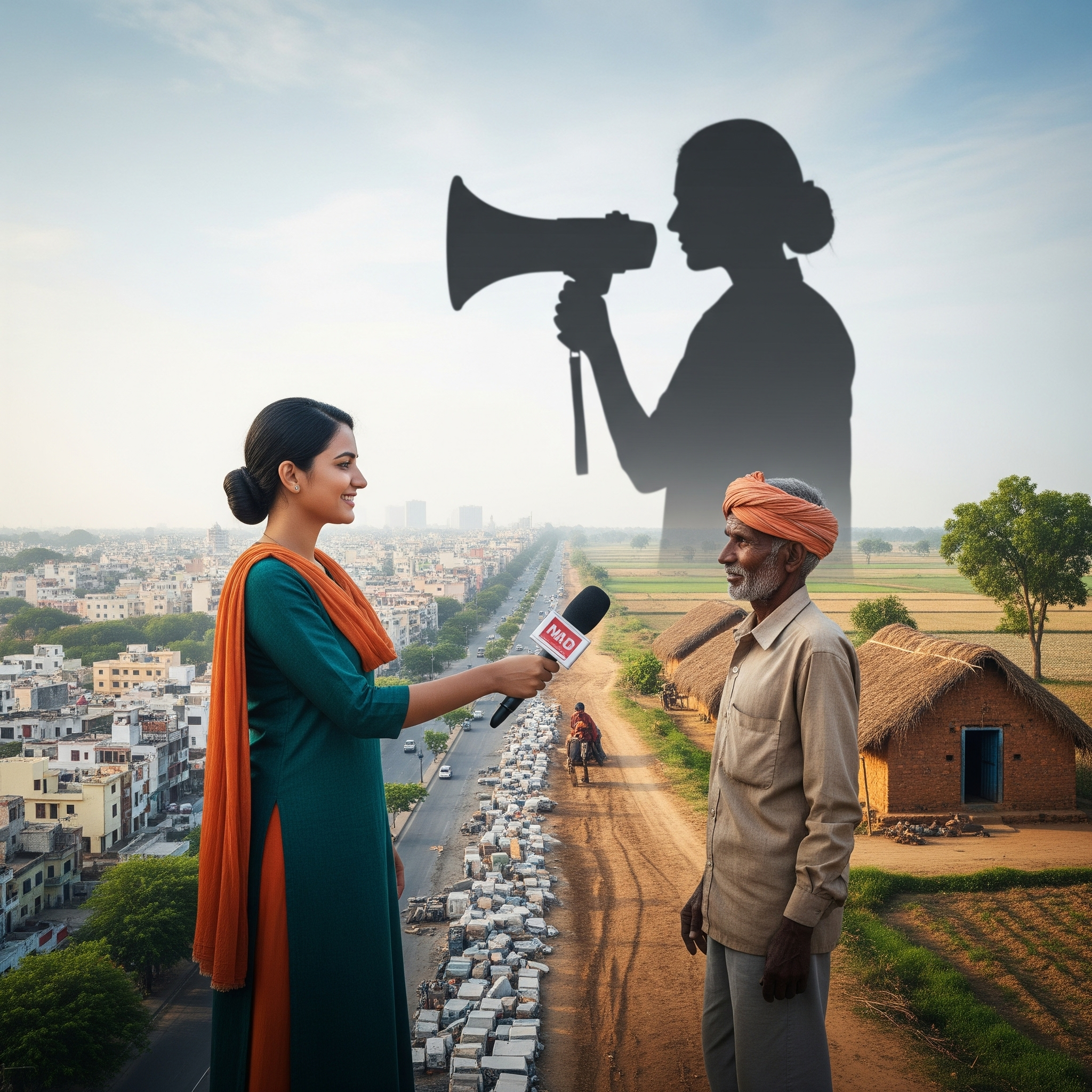*భారత్ Vs. ఇండియా: పాత్రికేయుని స్థానం ఎక్కడ?*
( *Bharat Vs. India: Where is the Journalist's Position?* )
In the ongoing debate between 'India' and 'Bharat', journalists are often accused of being part of an elite, out-of-touch circle. This question is about your own position in this divide.
When you travel from the city to the village, from your world to theirs, do you see your primary role as being a 'voice for the voiceless', which risks speaking for them? Or is it to be a 'microphone for their voices', which requires you to step back and cede the narrative?
Furthermore, how do you personally guard against your reporting becoming a form of 'extractive tourism'—where you simply take their stories of struggle for your urban audience and then leave—versus creating a space that truly reflects their agency, intelligence, and aspirations, not just their victimhood?
'ఇండియా', 'భారత్' మధ్య జరుగుతున్న ఈ చర్చలో, జర్నలిస్టులు తరచుగా వాస్తవానికి దూరంగా ఉండే ఒక ఉన్నత వర్గపు బుడగలో జీవిస్తారని ఒక విమర్శ ఉంది. ఈ ప్రశ్న ఆ విభజనలో మీ స్థానం గురించే.
మీరు నగరం నుండి పల్లెకు, మీ ప్రపంచం నుండి వారి ప్రపంచంలోకి వెళ్ళినప్పుడు, మీ ప్రాథమిక పాత్ర ఏమిటి? వారి తరపున మీరే మాట్లాడే ప్రమాదాన్ని తీసుకుంటూ 'గొంతులేనివారికి గొంతుకవ్వడమా'? లేక కథనంపై పట్టు వదులుకుని, వారి గొంతులకు 'కేవలం ఒక మైక్రోఫోన్గా' మారడమా?
ఇంకా చెప్పాలంటే, మీ రిపోర్టింగ్... కేవలం వారి కష్టాలను కథలుగా మార్చి, నగర ప్రేక్షకులకు అమ్ముకొని వెళ్ళిపోయే 'ఎక్స్ట్రాక్టివ్ టూరిజం' కాకుండా... వారి బాధిత్వాన్ని మాత్రమే కాకుండా వారి అస్తిత్వాన్ని, తెలివిని, ఆకాంక్షలను నిజంగా ప్రతిబింబించేలా మీరెలా జాగ్రత్తపడతారు?
( *Bharat Vs. India: Where is the Journalist's Position?* )
In the ongoing debate between 'India' and 'Bharat', journalists are often accused of being part of an elite, out-of-touch circle. This question is about your own position in this divide.
When you travel from the city to the village, from your world to theirs, do you see your primary role as being a 'voice for the voiceless', which risks speaking for them? Or is it to be a 'microphone for their voices', which requires you to step back and cede the narrative?
Furthermore, how do you personally guard against your reporting becoming a form of 'extractive tourism'—where you simply take their stories of struggle for your urban audience and then leave—versus creating a space that truly reflects their agency, intelligence, and aspirations, not just their victimhood?
'ఇండియా', 'భారత్' మధ్య జరుగుతున్న ఈ చర్చలో, జర్నలిస్టులు తరచుగా వాస్తవానికి దూరంగా ఉండే ఒక ఉన్నత వర్గపు బుడగలో జీవిస్తారని ఒక విమర్శ ఉంది. ఈ ప్రశ్న ఆ విభజనలో మీ స్థానం గురించే.
మీరు నగరం నుండి పల్లెకు, మీ ప్రపంచం నుండి వారి ప్రపంచంలోకి వెళ్ళినప్పుడు, మీ ప్రాథమిక పాత్ర ఏమిటి? వారి తరపున మీరే మాట్లాడే ప్రమాదాన్ని తీసుకుంటూ 'గొంతులేనివారికి గొంతుకవ్వడమా'? లేక కథనంపై పట్టు వదులుకుని, వారి గొంతులకు 'కేవలం ఒక మైక్రోఫోన్గా' మారడమా?
ఇంకా చెప్పాలంటే, మీ రిపోర్టింగ్... కేవలం వారి కష్టాలను కథలుగా మార్చి, నగర ప్రేక్షకులకు అమ్ముకొని వెళ్ళిపోయే 'ఎక్స్ట్రాక్టివ్ టూరిజం' కాకుండా... వారి బాధిత్వాన్ని మాత్రమే కాకుండా వారి అస్తిత్వాన్ని, తెలివిని, ఆకాంక్షలను నిజంగా ప్రతిబింబించేలా మీరెలా జాగ్రత్తపడతారు?
*భారత్ Vs. ఇండియా: పాత్రికేయుని స్థానం ఎక్కడ?*
( *Bharat Vs. India: Where is the Journalist's Position?* )
In the ongoing debate between 'India' and 'Bharat', journalists are often accused of being part of an elite, out-of-touch circle. This question is about your own position in this divide.
When you travel from the city to the village, from your world to theirs, do you see your primary role as being a 'voice for the voiceless', which risks speaking for them? Or is it to be a 'microphone for their voices', which requires you to step back and cede the narrative?
Furthermore, how do you personally guard against your reporting becoming a form of 'extractive tourism'—where you simply take their stories of struggle for your urban audience and then leave—versus creating a space that truly reflects their agency, intelligence, and aspirations, not just their victimhood?
'ఇండియా', 'భారత్' మధ్య జరుగుతున్న ఈ చర్చలో, జర్నలిస్టులు తరచుగా వాస్తవానికి దూరంగా ఉండే ఒక ఉన్నత వర్గపు బుడగలో జీవిస్తారని ఒక విమర్శ ఉంది. ఈ ప్రశ్న ఆ విభజనలో మీ స్థానం గురించే.
మీరు నగరం నుండి పల్లెకు, మీ ప్రపంచం నుండి వారి ప్రపంచంలోకి వెళ్ళినప్పుడు, మీ ప్రాథమిక పాత్ర ఏమిటి? వారి తరపున మీరే మాట్లాడే ప్రమాదాన్ని తీసుకుంటూ 'గొంతులేనివారికి గొంతుకవ్వడమా'? లేక కథనంపై పట్టు వదులుకుని, వారి గొంతులకు 'కేవలం ఒక మైక్రోఫోన్గా' మారడమా?
ఇంకా చెప్పాలంటే, మీ రిపోర్టింగ్... కేవలం వారి కష్టాలను కథలుగా మార్చి, నగర ప్రేక్షకులకు అమ్ముకొని వెళ్ళిపోయే 'ఎక్స్ట్రాక్టివ్ టూరిజం' కాకుండా... వారి బాధిత్వాన్ని మాత్రమే కాకుండా వారి అస్తిత్వాన్ని, తెలివిని, ఆకాంక్షలను నిజంగా ప్రతిబింబించేలా మీరెలా జాగ్రత్తపడతారు?
0 Comments
0 Shares
4K Views
0 Reviews




